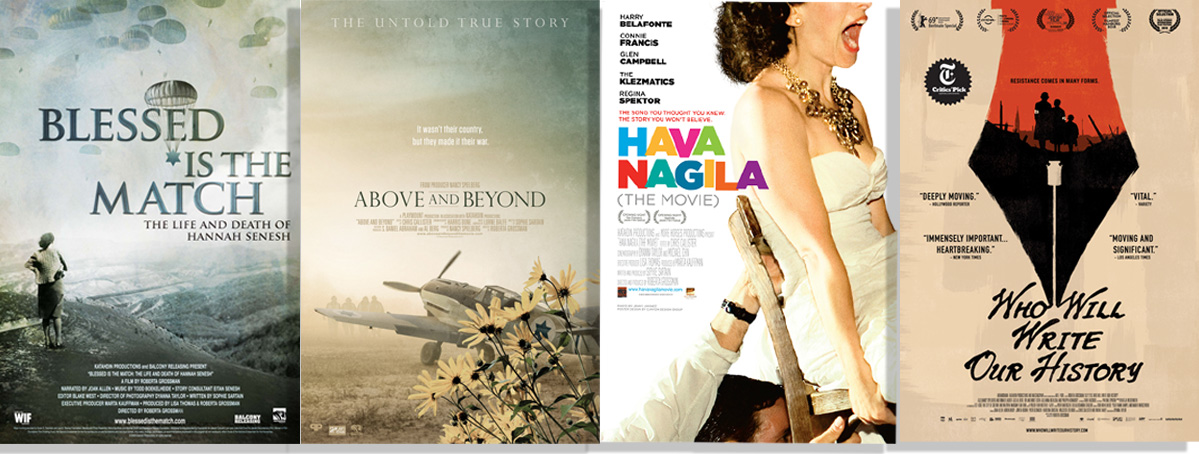
Noted filmmaker and writer Roberta Grossman has been selected to receive Taube Philanthropies’ 2020 Jewish Peoplehood Award. The award honors Jewish men and women who have worked to foster pride in Jewish identity and heritage for new generations, making a uniquely Jewish contribution to global culture. The award was created in 2011 by the Taube Jewish Peoplehood Initiative. In creating this honor, Tad Taube, chairman of the Taube Philanthropies, remarked: “Jewish Peoplehood is part of our shared heritage, values, and attitudes. It’s part of the DNA of Jewish life -- not only American or Israeli, but rather inclusive of all the nations of the earth.”
The Taube Jewish Peoplehood Award has three past recipients: the formerly Hasidic reggae musician Matisyahu; the board chairman of the Association of the Jewish Historical Institute Piotr Wislicki; and a co-founder of Warsaw’s post-communist Jewish community Dr. Stanislaw Krajewski. The award includes a $10,000 gift.
The 2020 award recognizes Ms. Grossman for her groundbreaking feature-length documentaries made on Jewish historical subjects, which shed light on important 20th century histories that were otherwise little known to a multi-generational public. Notably among her films, produced under the auspices of the non-profit production company Katahdin Productions, are Blessed Is the Match: The Life and Death of Hannah Senesh (2008), which tells the courageous and tragic wartime experience of Hannah Senesh, a World War II-era poet and diarist who made aliyah to British-mandated Palestine from Hungary, enlisted as a volunteer parachutist in the British Special Operations Executive in 1943, and returned to Nazi Europe parachuting behind enemy lines in an aborted mission to rescue Hungarian Jews, her mother among them. This film won the audience award at 13 Jewish film festivals, was broadcast on PBS, nominated for a Primetime Emmy, and shortlisted for an Academy Award.
Together with Sophie Sartain, Ms. Grossman produced Hava Nagila: The Movie (2012), a feature-length documentary that traces the cultural journey of the popular song, Hava Nagila, from Ukraine to YouTube. Released theatrically and screened at 80 Jewish film festivals, Hava Nagila: The Movie was either the opening or closing night selection at more than half of those festivals.
In 2015, Grossman directed producer Nancy Spielberg's feature-length documentary, Above and Beyond, which spotlights the Jewish American World War II-era pilots who volunteered to fight for Israel in its 1948 War of Independence, also establishing the Israeli Air Force. Interviews with pilots who flew these missions is one of the highlights of the film.
In 2018, Ms. Grossman wrote, produced and directed a powerful hybrid documentary/dramatic feature about the secret archives of the Warsaw Ghetto during World War II, assembled under the leadership of historian Emanuel Ringelblum. The film, Who Will Write Our History, was executive produced by Nancy Spielberg and is based on the acclaimed scholarly work of the same title written by historian Samuel Kassow and published in 2007.
Taube Philanthropies co-sponsored the Discovery Channel’s global broadcast of Who Will Write Our History in commemoration of International Holocaust Remembrance Day, January 27, 2020, which marked the 75th anniversary of the liberation of Auschwitz-Birkenau by the Soviet Red Army.
Said Taube, “Roberta Grossman has given the world a treasure trove of Jewish historical narratives that enrich our understanding of our history and deepen our sense of cultural pride.”
“Receiving this award is deeply gratifying, in part because it has allowed me to step back and see that there is an observable arc, a body of work that I've created with my long-time collaborators. I believe that film is the most powerful medium in which to tell historical stories and to me, very few histories are as compelling as the Jewish story. To receive this award from Taube Philanthropies is especially meaningful, not only because they have been so supportive of my work, but because we share our deep commitment to the Jewish people in all its messy and beautiful complexity and diversity."
Ms. Grossman initially considered pursuing a doctorate in history and embarking on an academic career, but ultimately regarded filmmaking and especially documentaries as a more effective way to engage with historical subjects and convey historical knowledge to broad and diverse audiences. The committee who unanimously selected her for the 2020 award commends her decision to share these compelling 20th century Jewish narratives through the widely accessible art form of feature-length documentary film.
